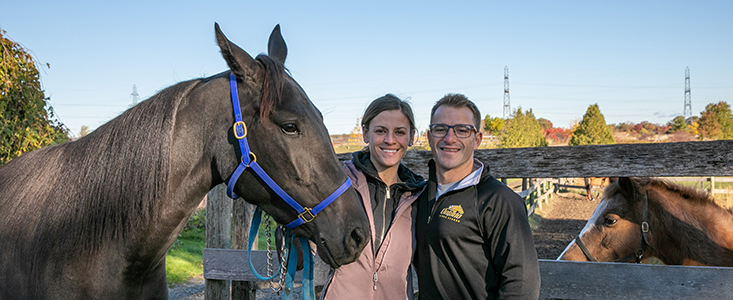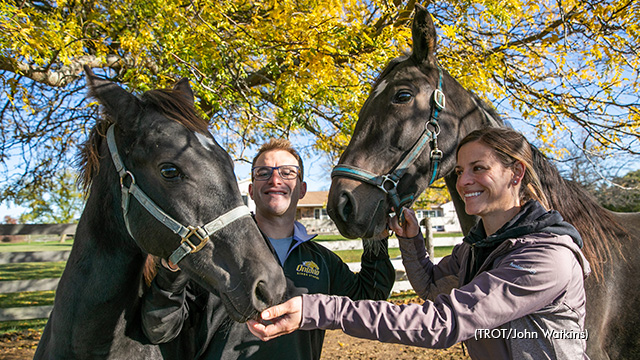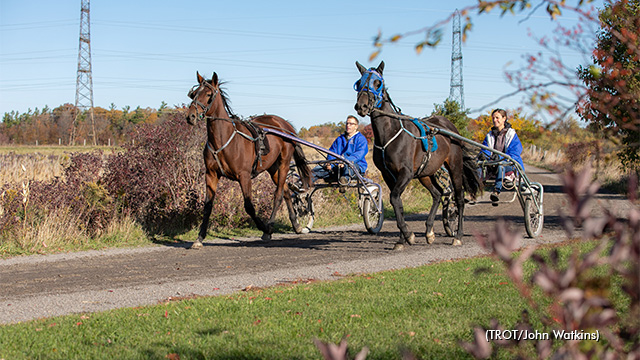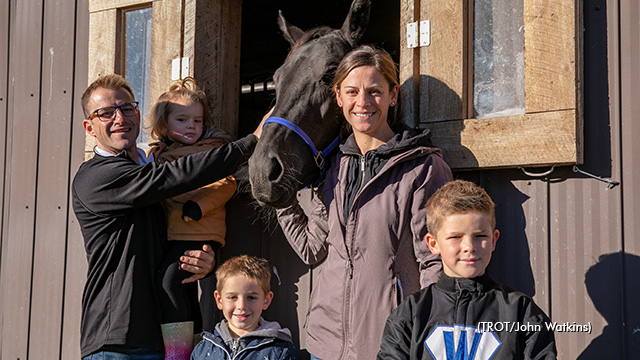Winning races is the ultimate high for most horsepeople, and even though Isaac Waxman has always been good at doing just that, the high was never enough. Whether it was winning races, drinking, drugs, or gambling, from a very young age, none of it was ever quite enough to make Isaac happy - he always searched for more. Now, with the love of his wife and family, and an inspirational sponsor, Isaac is finally starting to win at life, and he couldn’t be happier.
By Dan Fisher.
“I was a spoiled brat. My parents always supported me - my dad and step-mother support me to this day through horse ownership, and my mom has always been there for me emotionally - but sometimes I think that maybe they supported me too much. I think that I probably had too much freedom, and I didn’t care about the consequences of my actions… nobody ever seemed to hold me accountable and I basically got away with everything. I was really good at getting into trouble in life, but I was even better at getting out of it. I thought that I was indestructible, but actually I was just a real a-hole.” ~ Isaac Waxman

Some people in the harness racing industry may have seen, or may still see, trainer Isaac Waxman as a kid born with a silver spoon in his mouth - as they say though, the grass is always greener on the other side of the fence.
Many people may simply have assumed that due to family wealth, Isaac had it better than most. Money doesn’t always buy happiness however, and even though, for many years, Isaac thought he was happy and having fun, he really wasn’t. He was actually miserable inside of his own skin, and without even realizing it for a long time, he was actually trying to hurt himself. In his own words, he’s “lucky to even be alive today,” but he’s now quick to acknowledge the love of an amazing woman, the strength and wisdom of an incredible mentor, and the support of family, are the reasons that he is.
“I got into the business, really, when I was about 13-years-old,” Isaac reveals. “My dad [Warren] and my grandpa [Chester] always had horses, but J.R. Plante was friends with my cousin Daniel and that’s how we met… I started working a bit for J.R. [at age 13] and bought into my first horse [Test Case Hanover] in 2004, when I was about 17. I didn’t even tell my dad,” Isaac says with a chuckle, “and he wasn’t very happy about it. I guess I should have told him first but I had a coin collectables business on the side and had earned the money myself, so I guess I figured that I didn’t need to. We had Test Case a few different times and did pretty good with him. Then in 2006 I got my [trainers] license and I was training him. I also got in on my first yearling [Mach It Paid] that year, with one of my high school teachers, Jamie Kay, and he went on to make almost half-a-million dollars. I wasn’t like a lot of other kids in high school in that I was working with the horses, I had my own coin business on the side… I was even in on a horse with one of my teachers. I just loved the action… I was an adrenaline junkie and really loved the action - any action.”
There was another way, as well, that Isaac wasn’t like many of the other students - maybe it was that desire for the action, or simply the addictive personality that he was born with, but when he and other kids his age started experimenting with alcohol and drugs, Isaac soon found that he was the type that couldn’t get enough. “I went to a private school and I tried Ecstasy for the first time when I was only 12-years-old,” Waxman shares. “I don’t even know if I should say that, but it’s true and I want to be honest. At first I was just drinking a few beers and smoking some weed on the weekends, like other kids my age, but it didn’t take long before I didn’t want to put it down. Then, when I was 15, I was at a party, and some people had left some cocaine laying around… I tried that, and afterwards, that’s when things really went downhill for me in a big way.
“It wasn’t like I was doing it all the time… I’d go a month or more without it, but then I’d binge for a while again. Eventually I went into Homewood [a rehab centre in Guelph, Ontario] but I was there because other people wanted me to go, not because I wanted to be there… that’s probably why I got booted out,” Isaac recalls in a sombre tone. “I went there a second time too, but that time I went just to get everybody off my back, so that didn’t work out much better. I even went there a third time,” he admits.
By the time he was 19, however, and got his trainers license, it was probably fair to say that the young man was starting to gain a bit better control over his demons. “I’ve been going to meetings for more than 15-years now,” shares the married, 33-year-old father of three. “It wasn’t like I was abusing all of the time during those early years in my training career… but there were a lot of ups-and-downs. The stable was going great, we were really doing well. There was actually a poll on the Standardbred Canada website one time, that was asking people who should win the O’Brien for trainer of the year, and they even had my name on there as one of the choices, but a lot of people were talking behind my back too, and that infuriated me.”
With more than $240,000 purses from just 121 starts, and a UTRS of .513 in 2007, followed up by more than $700,000 in purses and an avg. of .385 in 2008, there’s no disputing that Isaac was succeeding as a trainer, but how were things going off the track? Success in racing seemed to be a bit of a double-edged sword for Waxman.
“We worked really hard and put in really long hours… we left no stone unturned. We were using magnets on all of them, and spending a lot on supplements like Swedish Horse Power and things like that. People would talk and say that I was just a rich kid, and that I would never have the work ethic to succeed… but things like that just drove me to work harder. Winning races fed the adrenaline junkie in me, but I found myself focusing more on the losses, and letting them really get me down. I didn’t even realize how unhappy I was, but that’s when I’d go on a binge. I was truly uncomfortable in my own skin, and I turned to anything that would take me outside of myself. People can get drugs all over the place, so I’m not blaming the racetrack at all for that, but back then the reality was that it was really easy to score around the backstretch at Flamboro, and when you mixed that with the highs and lows of racing, the whole scene was just a dangerous one for someone like me to be around,” Waxman admits.
“Whether it was gambling, or drinking, or drugs or winning races, I just needed the action. I didn’t ever want to come down from the highs… I didn’t like just being - I always needed more. I thought that I was doing it all to have fun, but looking back, I was only getting in deeper. I did get suspended once when my urine test showed traces of cocaine, but I was in trouble with the [ORC] judges all the time for other things too, like bad behaviour in the paddock or grandstand, or for lipping off to officials and stuff. One time [in 2011] I was racing two at Kawartha and they scratched my first one for being late for retention… she wasn’t late though, I was just out warming one up when they came into the barn and they didn’t see her in her stall and they scratched her. I went nuts, I was so mad - they wouldn’t have done that [I thought] to anyone else. I was actually on a 30-day driving suspension at that time, I was always in trouble, so I just went to the grandstand and started pounding back drinks. My other horse won and so I went out to the winner’s circle and I gave all the judges the finger. They fined me $5,000 for that and I didn’t even care… no one could tell me what to do or how to act,” Isaac reflects.
Waxman was a runaway train at times during these years, but would soon find himself as a dad, when his first son, Jacob, was born. “Becoming a dad did change things for me a little,” Isaac admits, “and it did help straighten me out to a degree, but it didn’t stop me… mostly it just made me feel more guilty when I did abuse. Things didn’t work out between Jacob’s mom and I, but it wasn’t only my issues at play there,” Waxman states. “That’s all I’m going to say about that, but I will say that his mom and I do get along very well to this day, we have shared custody of our son and have a very amicable relationship.”
It was after being single for about six months though, that Isaac would meet one of the people that has helped him turn his life around the most, the true love of his life - his wife Tess.

“I met Tess through Travis Henry one day a little over six years ago,” he recalls. I looked her up on Facebook afterwards and we started chatting. Tess has been around the business her whole life… her dad Carmen [Mauro] is a trainer. Tess has always liked working with quirky horses - ones that no one else can get along with, so I like to joke with her, that’s why she picked me,” he laughs.
As soon as Tess entered his life, things started to improve for Isaac. “She’s the complete opposite human being that I am,” Isaac states in all seriousness. She’s so calm and cool, and level-headed - she’s very laid back. She’s always been great for me… a calming influence.”
It’s not like Isaac Waxman completely got on the straight-and-narrow the day he met Tess however. The truth is that there were still a lot of rocky days ahead.
“There were still a couple of really bad incidents, after Jacob came along, and after I met Tess, that I’d probably refer to as me hitting rock-bottom - real turning points in my life.”
Both incidents came after Issac drove in a race at Flamboro where his horse had made a break. Each time he blamed himself and couldn’t accept his failure, and each time he was lucky to still be alive the next morning.
“One came when I drove a horse at Flamboro one night… we had the trailing spot. I was coming around to the front with it, and it made a break. I was really mad and I went straight to the grandstand after and started drinking. On the ride home Tess knew what was going on and she suggested that I go straight to bed when we got home. Instead, I snuck out of the house a bit later and took off to the casino. I was out gambling until about three in the morning, and was driving home really fast when I blew through a stop sign pretty close to our home and totalled our car. I blew every single window out… it was flipped upside down and it was all I could do to smash the door open so I could get out. The OnStar system had alerted the authorities but I didn’t want to be there so I ran home through the fields. I did eventually get charged with leaving the scene of an accident, and the police told me that looking at the wreck they couldn’t believe that I was alive. I wasn’t surprised at all though… I’ve always felt invincible and I’ve always seemed to get away with things.
“I was born with something called ‘transposition of the great arteries’ (a serious but rare heart defect where the two main arteries leaving the heart are reversed). They took me straight to McMaster [Hospital] right after I was born and did emergency surgery to correct it. Until I was 18-years-old I had to get a check-up at Sick Kids [Hospital] every six months and the doctors used to call me things like a ‘miracle baby.’ My parents used to call me that too. Maybe that’s why they weren’t hard on me, and why I always thought I could do and get away with anything… I don’t know.
“When I was 14, I stole my mom’s SUV and went for a joyride with my cousin. I wasn’t drunk or high or anything, but we got pulled over by the cops at 3am and they called my mom. She called my dad and he really didn’t even get mad at me.
“The second incident, and probably the one that opened my eyes the most, also came after I drove one at Flamboro that made a break on me. I remember being so mad that I had someone else take my horse home. I just got in my truck [with the trailer on] and drove straight to a dealer I knew in Brantford and picked up. My dad was actually bringing Jacob to me after the race because he was supposed to be staying with Tess and I that night, but I just took off. I didn’t wait for my son to arrive, and I didn’t take care of my horse. Instead I went to Brantford to buy drugs and I stayed out all night.
“It was after that night that I knew. They say that you have to be able to admit that you’re powerless to your addictions before you can get help, and I knew from what I did that night, especially with my son involved, that I was powerless to it,” Isaac has no shame now in admitting.

“Tess and her parents have just been an amazing influence in my life and in my recovery. I went into the Newport Center in Port Colborne after that [for a one month program]. Her parents have a great farm near St. Catharines where we live and where we keep our horses… it has a nice track, a pool where we swim them, and a big indoor arena where we can even jog them inside if the weather outside is too nasty. Her family, including her brother Frank and her sister Carolyn, are just such a solid and normal family, and they’ve taken me in and supported me. Her parents helped Tess take care of the horses while I was in Newport, and a lot of the time in the months after I got out. You’re taught that nothing comes before your sobriety, so even after I got out there were many times when I really had to lean on them for help and support.”
That brings us to what Waxman calls, “the final piece of his puzzle.” Isaac’s sponsor, Sayid Amini.
“Since I’ve finished at Newport I’ve continued going to meetings for the 12-step program. One night I listened to Sayid speak and his story just resonated with me… it was very similar to mine. I spoke to him afterwards and he agreed to be my sponsor. Sayid is the most humble and principled person I’ve ever known. He owns a high-end jewelry store in St. Catharines called Royalist Jewelers - I’ve spent a lot of time there with him. Sometimes when I’ve struggled I’ve just needed to be around him and he’ll just let me hang out in the back of the store for as long as I need to.
“In the program you learn a lot about yourself. You learn that addicts are usually at least one of, restless, irritable or discontent. You learn how to deal with these things and eventually you realize that there’s a higher power at work here, and a spiritual side to getting sober. Step 12 is actually about giving away what you have - giving back to help others the way that others have helped you. After two-and-a-half-years sober, I’m happy to say that I’ve even been helping others the way Sayid is still helping me.
“Something Sayid has often reminded me is that I don’t need to continually chase any longer - I was always chasing that next high. Sayid will put his hand up at the edge of the desk in his back office and say, ‘Isaac, stay off the edge. Stay off the edge Isaac.’ And it works for me when I hear him say that.”
Waxman’s success in getting his life in order - his actual sobriety date is March 22, 2018 - has also changed the way he views his training career. “I always needed that next target before - that next race, next week,” he shares. “Now I have so much more patience. I look at the big picture much more, and I think that it’s helped me have a lot more luck with young horses. I’m not in such a big hurry with them, but looking more for success in the long run. We even have a broodmare now [Twin B Inspiring] that made us a lot of money on the track… she actually paid for our wedding. Her first foal was two this year and had three second-place finishes in just four starts,” he proudly boasts.
Speaking of young horses, one of the other freshmen pacers in the Waxman Stable that has helped make 2020 another successful year on the track just happens to go by the name ‘Amini’. “Like I said, they teach you that there’s a spiritual side of rehab - the work of a higher power. Well I’ve had a lot of success buying yearlings from Bob [Ladouceur] at St. Lads Farm, and I was looking at this Sportswriter filly of his last fall, and she was actually born on my sobriety date - March 22, 2018. I thought that was more than just a coincidence, so I bought her and named her Amini, after Sayid. She won three OSS races this year and was third in the Grassroots Final. Sayid came to Mohawk to watch her with us that night… she’s made almost $60,000 for us.
“Another thing about my sobriety date,” Waxman tells, “is that it’s also Brandon Campbell’s sobriety date. Maybe that’s just coincidence too but I don’t know. We don’t really know each other but we’ve discovered through Facebook that we share a sobriety date, and we support each online with it. I really like being able to help people that have been through what I have,” Waxman beams. It’s what I’m supposed to be doing…. giving back. There’s a few people inside of our industry that I’ve been talking to a lot lately too. I’m really hopeful that I can help them,” Isaac says with pride in his voice.
“Sobriety is amazing,” he shares in all sincerity, “and I’m not just hanging on either… I’m totally content. Before it was like I was a 12-year-old in an adult’s body. I just swept everything under the rug my whole life. I was always pretty good at training horses, but I didn’t truly enjoy it like I do now. I’m a pretty good driver too, but I was way too much of an asshole to drive back then. Now, the way I see it, whatever happens out there happens. It’s all good.
“They call it the “We Program” in rehab because you can’t do it yourself. It takes having a lot of people behind you to get sober. I’m lucky in that on top of Tess and Sayid, I get amazing support from Tess’ parents, Carmen and Rae, my mom Shani and my step-father Harry, my dad and step-mom, Warren and Brenda, and even from a guy like my owner Dave Morgan. They’ve all been there for me. Not to mention that I’m so lucky to have three amazing kids in Jacob (8),Noah (5) and Addi (3). My family is everything to me.

“I really do see the light now. I love my life, I even enjoy things like nature, and I truly appreciate the horses more. I used to take things like the horses, and the love and support of my family, for granted - I don’t anymore. Looking back, it seems like everything before the past few years was all just a bad dream,” Isaac relates. “No, more like a nightmare.
“Sayid promised me early on that if I stuck with it and stayed sober, I would become an asset to my family instead of a liability. That has come true. I’ve learned that it’s during the toughest times that we grow the most. Before, it didn’t matter what went right, I was never happy. Now, most days, I feel like the luckiest man alive.”


